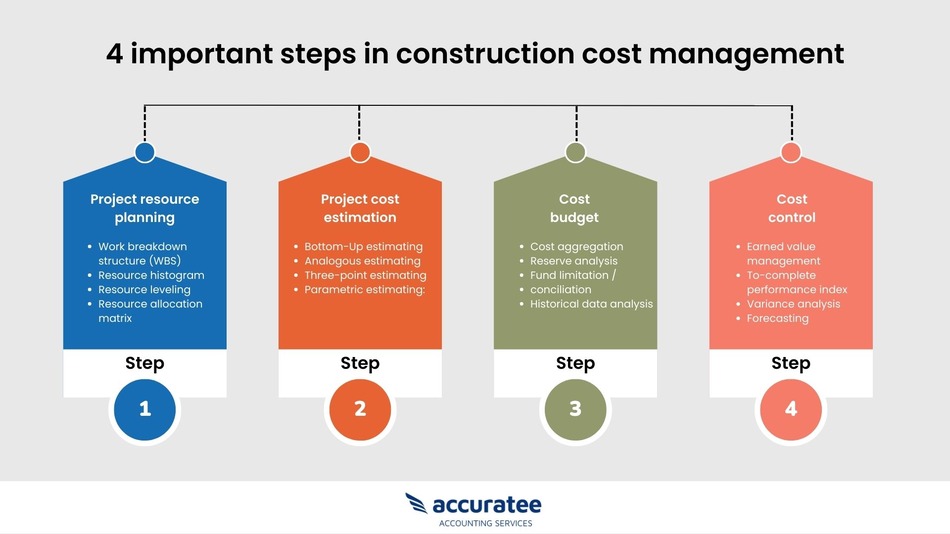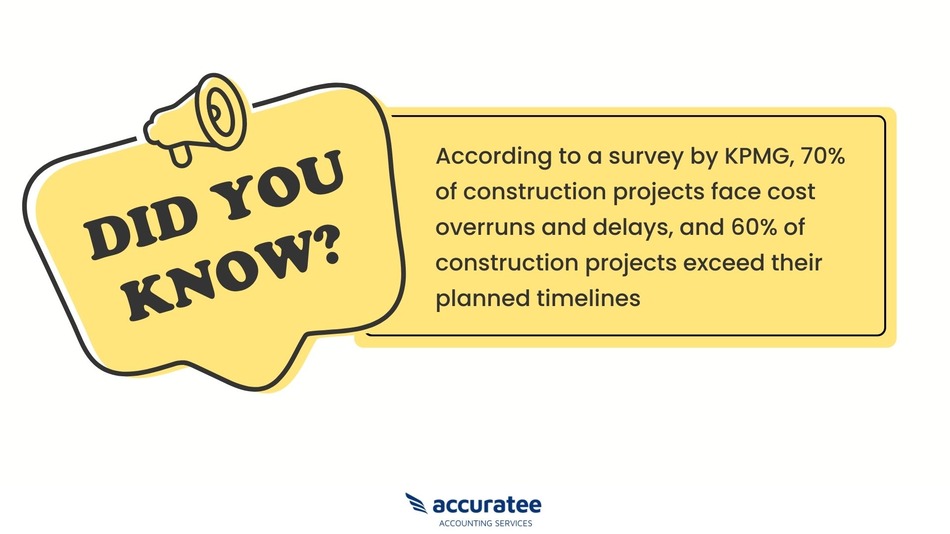How important is construction cost management in tracking project expenses
Introduction:
As a construction project manager, you must have complete control and oversight of all the financial aspects of each project in order to ensure that it is completed on time and within budget. Keeping accurate records of expenses while staying within the allocated funds can be a challenging task. It's why having a good understanding of construction cost management is essential for any organization wishing to succeed in this sector.
In this blog post, we'll explore how vital cost-management strategies are when it comes to monitoring project expenditures accurately, and what tactics you should be implementing to keep everything ticking over smoothly.
Key takeaways
Construction cost management is the strategic process of controlling expenses associated with construction projects.
Effective cost management practices help improve project profitability, reduce risk, and enhance client satisfaction.
Managing construction costs is critical to ensuring a project stays on track and meets its objectives.
Project resource planning and cost estimation are two crucial steps in effective construction cost management.
Accurate cost estimation is an ongoing process that involves predicting the total cost of completing a project within a specified scope.
What is construction cost management?
The construction sector is an important sector in both developed and developing countries, and has a direct and indirect impact on many other sectors. Therefore, it's important to manage this sector wisely, particularly in the aspect of cost management.
Construction cost management is a strategic process that involves the identification, analysis, and control of expenses associated with construction projects. It includes budgeting, forecasting, resource allocation, and cost optimization to ensure that projects are completed on time, within budget, and to the required quality standards.
Effective construction cost management requires a thorough understanding of the cost drivers specific to the construction industry, including labor, materials, equipment, and overhead. It also involves collaboration between stakeholders, including owners, architects, engineers, contractors, and subcontractors. By implementing cost management practices, construction firms can improve project profitability, reduce risk, and enhance client satisfaction.
Importance of construction cost management for successful project completion
Managing construction costs is a critical component of ensuring that a project stays on track and meets its objectives. Whether you're building a house, a commercial building, or undertaking any other construction project, staying within budget is key to its success.
To effectively manage construction costs, you need to define a budget that includes all the necessary expenses. For example, if you're building a house, you need to define a budget and allocate funds to different aspects such as architecture, materials, labor, and permits.
With a predefined budget, you can make critical decisions such as whether to use expensive materials or cost-effective ones, and how to distribute the budget to different aspects of the project. You can also decide whether to hire a general contractor who can handle the entire project or hire individual contractors for specific tasks.
Without a budget, it's difficult to make informed decisions and assess whether you're progressing in the right direction. In large construction projects, managing costs can be challenging due to the complexity of the project and unforeseen costs.
Effective cost management practices can help construction project managers:
- Set clear expectations,
- Prevent scope creep, and
- Track progress.
By regularly reviewing the budget and comparing it with actual expenses, project managers can identify areas where costs can be reduced or reallocated. They can also respond quickly to any deviations from the budget and take corrective action to keep the project on track.
Furthermore, cost management can help organizations in following ways
- Maintain expected margins,
- Increase ROI, and
- Avoid losing money on the project
By generating data from past projects, they can benchmark for future projects and track long-term cost trends. Therefore, It's really important to manage your construction project costs effectively so that you can get the results you want and make the most out of your investments.
4 important steps in construction cost management
Here are the top four important steps that construction managers should follow to manage construction project costs effectively:

Step 1: Project resource planning
Resource planning is the initial step in any project, which involves the identification of required resources to carry out the project and bring it to completion. These resources include personnel, such as employees and contractors, as well as equipment such as specialized machinery and infrastructure.
The purpose of resource planning is to ensure that the necessary resources are available and properly allocated before the project starts. This process is crucial to the success of any project as it lays the groundwork for the execution of the project plan.
The different techniques that can be used to in this process includes the following:
-
Work breakdown structure (WBS)
A WBS is a hierarchical breakdown of the project scope into smaller and manageable work packages. This technique helps identify the necessary resources needed for each work package, making it easier to plan and allocate resources accordingly.
-
Resource histogram
A resource histogram is a graphical representation of the resources required for each task over time. This tool helps project managers visualize resource utilization and identify potential resource constraints.
-
Resource leveling
Resource leveling is a technique used to adjust the project schedule to ensure that resources are available when they are needed. This technique helps identify resource conflicts and adjust the project schedule accordingly.
-
Resource allocation matrix
A resource allocation matrix is a tool that shows how resources are allocated across different tasks or work packages. This technique helps identify resource gaps and ensure that resources are allocated efficiently.
Step 2: Project cost estimation
Cost estimation is the practice of calculating the expenses associated with every resource required for each scheduled activity in a construction project. This is a crucial aspect of cost management in construction.
The goal of cost estimation in construction is to predict the total cost of completing a project within a specified scope. Since the scope of a construction project may change over time, cost estimation is an ongoing process.
To effectively manage construction costs, project managers must stay up-to-date with budgetary changes throughout the duration of the project. These cost estimations encompass all the expenses needed to achieve successful completion of the construction project.
There are several techniques that can be employed to arrive at accurate cost estimates, including:
-
Bottom-up estimating
This technique involves breaking down the project into smaller components and estimating the costs of each component separately. This method is time-consuming but is widely considered to be the most accurate technique as it takes into account all the details of the project.
-
Analogous estimating
This technique involves using past similar construction projects as a basis for estimating the costs of a current project. While it may not be as accurate as bottom-up estimating, it is a quick and useful technique to get a rough estimate of the costs.
-
Three-point estimating
This technique involves using three estimates for each activity: the best-case scenario, worst-case scenario, and most likely scenario. This method allows for a more accurate and realistic estimate and is especially useful for high-risk projects where there is a higher degree of uncertainty.
-
Parametric estimating
This technique involves using statistical data and mathematical models to estimate costs based on specific project parameters, such as size, materials, and labor requirements. This method is especially useful for repetitive projects with historical data to predict costs accurately, but may not be as accurate for unique or complex projects.
Turn Your Bookkeeping into a Breeze!
Step 3: Cost budget
Cost estimates are useful in determining the expenses associated with individual project tasks and the overall project cost. On the other hand, the budget allocates project costs over an extended period to establish a cost baseline that can be used as a starting point for current and future projects. Essentially, it gives you an indication of the amount of money available to spend on the project.
The different techniques that can be used to set cost budget that helps to increase construction project cash flows includes the following:
-
Cost aggregation
This technique involves grouping the estimated costs of different activities in a project together, to see the total cost and the biggest cost parts. It helps to keep track of the budget and predict how much money will be needed for the whole project.
-
Reserve analysis
This technique involves setting aside contingency reserves to cover unforeseen expenses and risks that may arise during the project. This is a way to manage project uncertainties and reduce the impact of risks on the budget.
-
Fund limitation/conciliation
This technique involves setting a budget limit or cap for the project and managing the project to stay within that limit. This ensures that the project is completed within the available budget and prevents cost overruns.
-
Historical data analysis
This involves using data from past projects to estimate costs for the current project. This technique is especially useful when there are similar projects with comparable scope, size, and complexity.
Step 4: Cost control
The process of cost control entails identifying variations from the predetermined cost baseline and taking corrective measures to prevent exceeding the budget. All deviations from the cost baseline must be documented, and the estimated total cost should be adjusted to incorporate these changes.
The different cost control techniques and tools that can be used to increase cash flows and minimize project risk includes the following:
-
Earned value management (EVM)
EVM is a method for measuring project performance and progress by comparing the actual cost, schedule, and work completed against the planned cost, schedule, and work. This technique helps identify variances and forecast potential cost overruns.
-
To-complete performance index (TCPI)
It is a measure of the cost performance required to achieve a specific management goal. It forecasts the expected cost performance required to complete the remaining work in order to achieve a specific target.
-
Variance analysis
It is the process of comparing actual project performance against planned or expected performance to identify and explain any deviations or variances. It helps identify potential problems and supports decision-making to correct or mitigate those problems.
-
Forecasting
This process uses past performance data and current project data to predict future project performance. It helps identify potential issues early and provides
Pitfalls of poor construction cost management
Poor cost management in construction can lead to significant pitfalls for projects, including delays, quality issues, and financial losses.

These delays and cost overruns can be caused by various factors, including:
- Inadequate project planning,
- Poor communication among stakeholders,
- Inaccurate cost estimating, and
- Changes in project scope.
When cost management is not given enough attention in construction projects, it can result in a negative impact on the overall project timeline and the bottom line. Additionally, it can lead to conflict between contractors, owners, and other stakeholders.
Moreover, cost management failure can sour relationships and damage reputations in the industry. It's essential that all aspects of the project are thoroughly planned, and contingencies are in place for potential issues that could arise.
Investing in the right people, tools, and processes can make all the difference in avoiding the potential pitfalls of poor cost management in construction.
How to improve construction cost management?
There are various methods that can be employed to effectively manage costs in construction projects, including utilizing modern technologies and job costing software that can be applied at every stage of the project. These solutions can facilitate better cost predictions, automate budget tracking, keep an eye on expenditures, and offer real-time data for informed decision-making.
Here, we have discussed some of the key methods to improve construction cost management:
-
Accurate cost estimation
Conducting thorough research and gathering comprehensive data to create a precise cost estimation.
-
Regular cost tracking and analysis
Constant monitoring of project costs against the estimated budget to ensure that the project stays on track.
-
Effective communication
Clear and concise communication among all stakeholders to ensure that there are no misunderstandings or discrepancies.
-
Efficient resource management
Making efficient use of resources and ensuring that materials and labor are used optimally.
-
Implementing technology
Incorporating technology such as construction management or accounting software to streamline processes, improve accuracy and reduce errors.
-
Risk management
Identifying potential risks and developing contingency plans to mitigate the financial impact of unforeseen events.
-
Contract management
Ensuring that contracts are reviewed thoroughly and that all parties adhere to their contractual obligations.
-
Continuous improvement
Regularly reviewing processes and procedures to identify areas for improvement and implement changes to increase efficiency and reduce costs.
Conclusion
Construction cost management is an essential aspect of project management that ensures the success of construction projects. By effectively tracking project expenses, construction managers can identify potential risks and make informed decisions that keep projects on budget and on schedule. With the help of advanced technologies and specialized software, construction cost management has become more efficient and accurate than ever before.
At CleanSlate, our team of construction accounting professionals understands the challenges of managing construction costs and provides tailored solutions to meet our clients' needs. By leveraging our expertise in accounting and financial management, we help our clients streamline their operations and maximize profitability. With CleanSlate, you can trust that your construction project's financials are in capable hands. Contact us to learn more.









